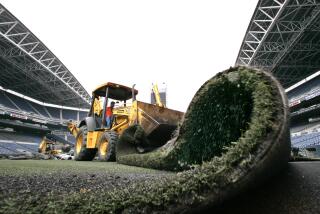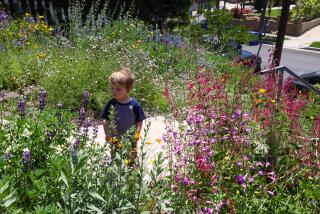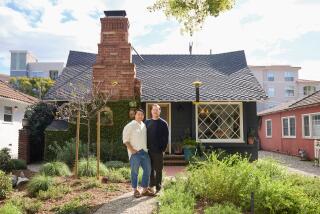Drawing a line in the grass
SOMEONE who finds that “the sight of a well-kept lawn borders on the transcendental” [“Public Enemy No. 1,” July 5] should go for AstroTurf. Lawns are ecologically unsound because they are not indigenous and need too much water, not to mention power or gas for mowing. Animals are usually banned from them as well, so they aren’t even any fun. Well-kept lawns annoy me, and there goes transcendentalism. Get a grip! Plant indigenous! Enjoy nature!
PAULI PETER
Los Angeles
*
YOU’VE got to be kidding me! Yes, having a green, lush lawn in a desert is ridiculous. But it is far from the worst offender. You should study a corporate beef farm if you want to see a colossal waste of water. And there is absolutely no reason to even farm beef in California. We produce plenty in Texas, Wisconsin and elsewhere -- places where there’s little worry about water.
DAVE NESBITT
Culver City
*
APPARENTLY, the connection between a large lawn and the wealth of an individual was first made in Merry Olde England: The size of a person’s lawn was proportionate to the number of sheep he had “mowing” the grass. The more sheep you had, the more lawn you could maintain. The more grass you converted to wool, the wealthier -- and warmer -- you were in the wintertime.
REID BLICKENSTAFF
Silverdale, Wash.
*
SEVERAL members of clubs belonging to the Garden Club of America were concerned when Joe Robinson wrote that in the 1930s GCA promoted the lawn as “a badge of suburban affluence, a civic duty of sorts.” A recent GCA publication “The New American Lawn” states that “corporations as well as landowners can go the route of the New American lawn -- decreasing lawn size, saving money and becoming models of sound ecology. It’s good business -- financially and environmentally. Landscape fragmentation and loss of biodiversity have become major biospheric issues, which can be addressed by moving away from monocultures such as lawns of grass.”
While the Garden Club of America may have promoted lawns in the ‘30s, we wanted Times readers to know we are right there with sound ecological practices of the 21st century. (A new American lawn brochure can be accessed at www.gcamerica.org)
FRANCISCA B. NEUMANN
Diggers Garden Club
Pasadena






